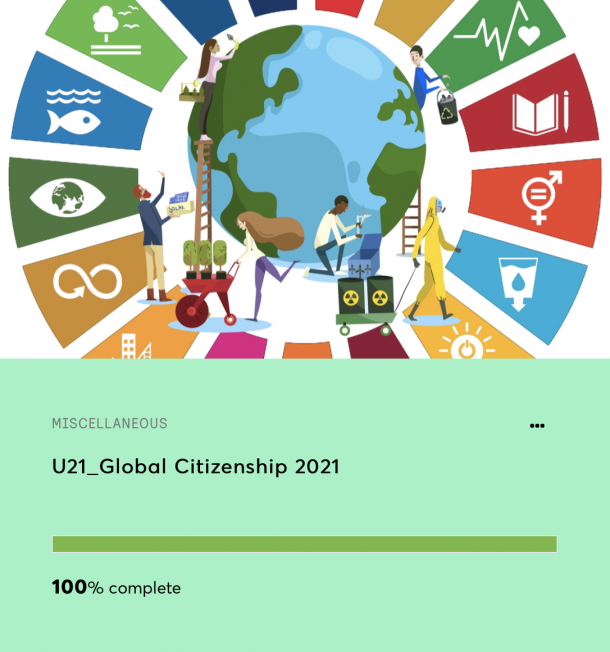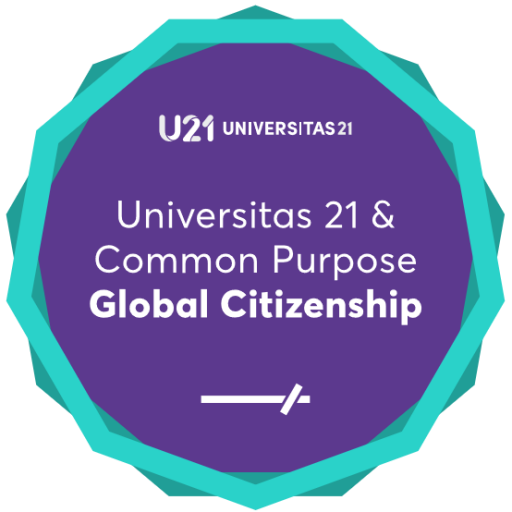Reflecting on U21 Global Citizenship Program: Envisioning a Future of Cooperation
Tue, Jun 8, 2021-
Tags
Report on participation in the U21 Global Citizenship program
Waseda University is a member of U21, a global network of 27 leading research-intensive universities. U21 activities are based on the three pillars of Researcher Engagement, Educational Innovation, and Student Experience. Waseda is the only Japanese university participating in this international consortium of top-level universities.
U21 Global Citizenship was a three-week program held online. The program included on-demand courses, as well as real-time lectures involving joint study with students from 18 countries worldwide, all from member universities of U21. In this program, students learn about and discuss complex issues facing our contemporary world and societies. Many Waseda University students participated, with 42 students completing the entire program.
One of the students who participated in the spring 2021 Global Citizenship program was Peter (Siyuan) Chai. Peter is a fourth-year student in the Department of Economics at Waseda University’s School of Political Science and Economics.
We asked him about his experience at the U21 Global Citizenship program and this is what he shared with us.
Program Format and Contents
The three-week U21 Global Citizenship program organized by Universitas 21 and Common Purpose in March and April utilized a series of inspiring speeches, interviews, articles, and research findings from scholars, business leaders, and journalists to deepen our understanding of the characteristics, significances, and interconnectedness of the 17 UN SDGs which address various global challenges faced by mankind and to make us think about what kinds of meaningful changes we can bring to our international community through joint efforts.
Moreover, through allowing peers to openly leave comments and thoughts under each online module and discussion section as well as to interact extensively in communities of practice, private messaging, and real-time Zoom workshops, students from 27 universities all around the world were able to share diverse ideas and viewpoints, based on our personal experiences and areas of research and expertise, and from multi-cultural perspectives. Especially, this program provided me with an invaluable chance to make friends with other academically passionate individuals who come from prominent European universities, such as KU Leuven in Belgium.
Program Philosophy and Inspirations
This program introduced to us the technique of design thinking which is taught at Stanford d.school. Design thinking not only could help us to build the so-called “creative confidence,” but also could guide us to think about complex topics in a step-by-step manner through an approach named “guided mastery.” I personally found it very useful in exploring and analyzing the applicability of the SDG of focus I chose, which was Goal 5: Gender Equality, and envisioning feasible and viable solutions to improve its implementation in Asia. I believe that I could also easily apply the design thinking method frequently in my future social science research as well as in making my daily-life decisions.
In addition, this program taught me about the importance and potential of collaboration in tackling cross-border issues and the mindset of “testing to learn, not testing to validate.” This means that as global citizens and young scholars of the new generation, it is a good idea to repeat the process of ideation, prototyping, and evaluating the impacts and feedback of our action plans and policy proposals continuously to solve common crises in creative ways. To make wise choices, we need both rapid action and constant reflection, and we need to work in different networks, institutions, and sectors of society with the aim of self-efficacy in mind. Furthermore, this program allowed me to reflect on the power of research in some emerging sub-disciplines in Economics such as Development Economics and Environmental Economics in shedding light on the SDGs and human welfare with the help of statistics and big data.

COVID-19 and A Future of Cooperation
COVID-19 reminds us of both the potential fragility and resilience of human communities worldwide, and it also strongly reminds us of the strength that is probably unique to human being which is to face challenges on a collective basis and to quickly adapt to new ways through which human activities can be adjusted and arranged. COVID-19 is urging us to stand and bond together, to innovate, and to care for vulnerable and disadvantaged groups.
From my perspective, governments, private sectors, and civil societies could probably take this opportunity to consider their complementary roles in forming and implementing response strategies and preventive measures to international urgencies. With mutual understanding, respect, and learning across regions and generational cohorts, mankind can step up a team spirit and engage in more inclusive and effective discussions. I wish that more people could pay attention to the SDGs, gender equality, and mental health and contribute our efforts to make the world a better place!
















